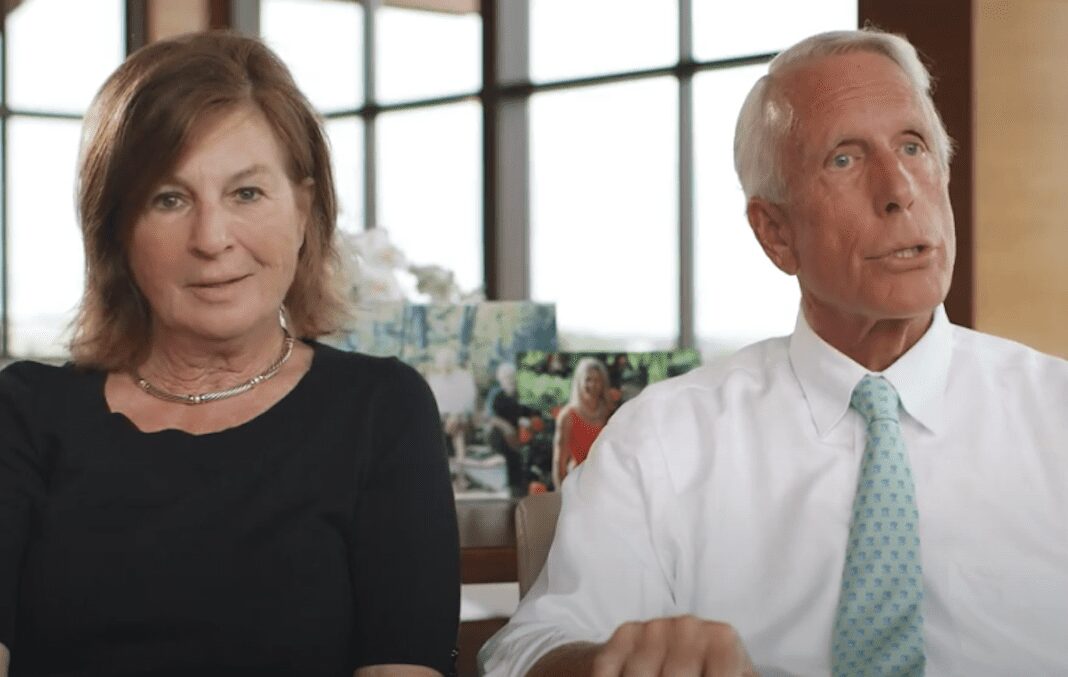Meet Rebecca Cooke, the Democrat challenging Wisconsin GOP Rep. Derrick Van Orden
Cooke is hoping that her local roots will help her unseat the incumbent election-denying Republican.

Rebecca Cooke has an atypical background for a congressional candidate.
She doesn’t hail from a political dynasty — her parents were local dairy farmers, she said, until they had to sell their milk cows due to the financial strain of competing with larger operations — and didn’t pursue a career in law or corporate America.
“I’m a working-class candidate, I grew up working class, I’m still working class,” Cooke told the American Independent Foundation in an interview. “I’m running a small business, it’s a little Airbnb business that I host pop-up restaurants at, I also run a nonprofit that supports women entrepreneurs throughout 10 counties in our region, and then I’m waitressing.”
“I think people are looking for congressional members that are more reflective of everyday people,” she added. “I mean, how many small business-owning waitresses that were Holstein champions do you know in D.C.? Very few.”
Cooke announced that she was running for the Democratic nomination in Wisconsin’s 3rd congressional district on July 10. If she wins the primary, Cooke will face off against incumbent Republican Rep. Derrick Van Orden, a Jan. 6 attendee who made national headlines last month after berating a group of teenage Capitol pages. According to Punchbowl journalist Jake Sherman, the former SEAL called the pages “lazy shits” for allegedly lying down on the Capitol rotunda.
“Wake the f— up you little s—s. What the f— are you all doing? Get the f— out of here. You are defiling the place,” NBC News reported the election-denying congressman screaming at the pages. Van Orden had also hosted a beer and cheese event earlier that night, according to a spokesperson. After his outburst, Van Orden received a rare bipartisan rebuke from Senate Majority Leader Chuck Schumer (D-NY) and Minority Leader Mitch McConnell (R-KY).
“Derrick Van Orden is an embarrassment who clearly lacks the temperament to represent Wisconsin and our values,” Cooke said in a statement. “Where was his concern for history on January 6th when he and his MAGA buddies besieged the Capitol, resulting in 140+ injuries to police officers and deaths?”
Wisconsin’s 3rd congressional district narrowly elected Van Orden over Democratic State Sen. Brad Pfaff in the 2022 midterms. The swing district has, like most rural areas, become increasingly conservative in recent years. Van Orden, who had nearly unseated the district’s now-retired incumbent Democrat in 2018, raised four times more than Pfaff and enjoyed support from some of the GOP’s biggest donors and super PACs.
Cooke said that “not letting Derrick Van Orden get too comfortable in his seat” was an important reason for announcing her campaign so early. “This is a very tactile campaign, and that’s kind of how we ran last cycle,” Cooke said of her second effort. “We’re in person, we’re knocking doors, we’re doing a lot of grassroots organizing.”
“He’s an author, he’s an actor, and I think Congressman is just another feather in his hat,” Cooke said of her opponent. “I just don’t think he’s reflective of who we are as a district at all. And I don’t think that he’s in DC for the right reasons,” she added. “I don’t think he’s there to work for working-class people.”
At the heart of Cooke’s campaign pitch are her close ties to the district and deep local roots, which she contrasts with Van Orden, who was born in Minnesota.
Cooke grew up on a dairy farm in the district and attended Eau Claire North High School. “When I was growing up the first office I held was 4 H president,” Cooke joked.
In addition to her family’s farm, Cooke’s parents leased another property in an effort to compete with big dairy producers.
“We had to sell our cows because of the price of milk and competition with larger dairies, which was really tough,” Cooke said. “I think that is the story of a lot of western Wisconsin families. It’s just hard to make it as a small family farm unless you become big.”
To Cooke, that’s representative of a bigger story.
“Communities have felt forgotten, not just by the party, but in general, you know, economically, and there’s a lot of hopelessness and giving people something to be excited about to believe in that we can kind of change things,” she said.
“What I bring to the table is my ability to be able to connect, in particular with rural voters that I think feel very left behind by the Democratic Party,” she said. “You can’t manufacture authenticity.”
Published with permission of The American Independent Foundation.




